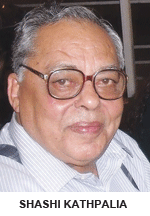 The world of education has grown and expanded exponentially into diverse areas. So have institutions and facilities. But it’s important to remember that sound foundations of young minds are best laid in pre-teen and teenage years. Therefore the school years are a very crucial period in every child’s life. Infrastructure and other facilities in a school are highly prized, but high-quality teachers are the most valuable asset of a school and the most critical evaluation parameter. Every Teacher’s Day (September 5) I vividly recall an exemplary teacher.
The world of education has grown and expanded exponentially into diverse areas. So have institutions and facilities. But it’s important to remember that sound foundations of young minds are best laid in pre-teen and teenage years. Therefore the school years are a very crucial period in every child’s life. Infrastructure and other facilities in a school are highly prized, but high-quality teachers are the most valuable asset of a school and the most critical evaluation parameter. Every Teacher’s Day (September 5) I vividly recall an exemplary teacher.
Jagan Nath Grover was a highly respected and committed teacher at the DAV School, Lahore, and after India’s partition, at Ludhiana’s Arya High School. History and geography were the subjects he taught. He also authored books in both subjects which were widely read for decades by students in Punjab and beyond preparing for the matriculation examination before and after India’s independence.
Grover Sir was invariably attired in a kurta, narrow pyjama with an achkan crowned by a turban, all white, simple and elegant. Noisy classrooms became dead silent as he entered, imposing and on the dot. Boys stood still at their desks, until he gestured to them to take their seats and walked briskly to the blackboard. Quite effortlessly, he would chalk a neat and accurate map of India or Britain — depending on the lesson — which would have done even professional artists proud. Thus began his history lessons.
I still recall his evocative recitations of India’s evolution from ancient, medieval and modern times to its partition and independence. Essential facts about kingdoms, dynasties, rulers, religions, languages, customs and much else concerning India were gently, but firmly, infused into young minds. His bilingualism — command of English and Hindi — was outstanding. This enabled his descriptions and portrayal of the tipping points of history to be so forceful and dramatic that students imagined themselves to be part of the narrative.
Although a committed nationalist, no bias ever clouded his mind while teaching history. Grover Sir praised the likes of Bentinck, Curzon among others who, he felt, despite their imperialism, enriched India and its people through administrative reforms. His assessments of Akbar the great and Shahjahan the builder — if not emperor — and many others whose origins were not Indian, were equally objective. Unfolding events and happenings had little space in his lessons. He felt they were not yet history, although he often expressed the hope that much of what was going on in Indian politics and society would not be perpetuated.
Outside class, Grover Sir kept to himself. With his colleagues he was polite but somewhat aloof. He had no interest in gossip or small talk. In school few, if any, could claim to be his close friends. This was not due to eccentricity or a sense of superiority, but the consequence of his adherence to sound principles and values with which many of his colleagues didn’t feel comfortable. Those who did, tried to emulate his example.
This exemplary teacher was often perceived as severe. But this was a misperception. For instance, he rarely punished children. When he did, it was by way of instructing offenders to draw maps of India or Britain and undertake connected projects which were assessed and evaluated by non-offending peers. And often he would opine that the marks awarded for such projects were less than deserved. Little wonder punitive projects were welcomed by victims as well as student evaluators.
Nor was Grover Sir bereft of humour. in fact, his lessons were laced with it. When recounting the stand-off between the Spanish Armada and the English fleet led by Sir France Drake in 1588, he took pains to disassociate the Duke of Medina Sedonia, who led the Spanish Armada, with the holy cities of Medina (and Mecca) — familiar to Indian students.
Justice Mehr Chand Mahajan, a renowned former president of the 700-strong DAV education institutions, prime minister of Jammu & Kashmir, and chief justice of India was reported to have remarked in the 1950s that the two schools — in Lahore and Ludhiana — and legions of students who schooled there were singularly fortunate in having Grover Sir as a teacher. But fame and recognition didn’t seem to impact the mind or sensibilities of this great educator. If and when they were showered upon him, they affected neither his style nor personality.
In an increasingly material and competitive world, school managements have had to succumb to commercial pressures often at the expense of time-tested concepts and values. True, world-class and globally-competitive education is a laudable objective. However, to attain this goal, prime importance should be given to nurture the intellectual and socio-economic growth of teachers. J.N. Grover who shaped his own classroom style and the destiny of so many students — including this writer — was an exception whose replica would be hard to find in contemporary Indian education.
Read: Mentorship teacher development model
(An alumnus of St. Stephen’s College, Delhi, Shashi Kathpalia is former senior manager of Hindustan Lever)























